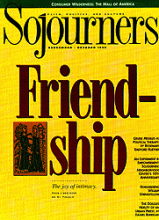I recently saw a special episode of Siskel & Ebert at the Movies in which the two film critics ran down a list of some of their favorite moments in screen history. Most of the clips were fairly predictable, or at least understandable and well-defended, but about halfway through the program Siskel picked a dance scene from Saturday Night Fever as a fave, a choice that stunned Ebert. The scene, Siskel rhapsodized, captured the essence of the dance floor as a raceless, classless, communal sweat-box. In his opinion this was one of the more moving scenes committed to celluloid.
While Ebert stared at his partner in mute shock--it was as if Siskel had demanded that Sylvester Stallone be given a lifetime achievement Grammy--I found myself nodding in agreement with Siskel. Not necessarily about Saturday Night Fever, but about the strange magic of the dance floor and its powers of transcendence.
It dawned on me that it took courage for Siskel to go out on a limb in the name of disco, and I realized that there is a pervasive anti-dance-music prejudice among not only movie critics but "serious" rock fans, who think that for music to have meaning it must have "meaningful" lyrics, or at least loud guitars.
This attitude--what I call the Wayne's Worlding of pop--holds that dance music is somehow not as relevant as rock with a political message. It is, of course, a crock. Rock and roll's origins are in the motion of the body and the song of the spirit as much as the workings of the mind; no matter how trenchant the social commentary in a pop song, if it's wedded to a lame groove, it's not going to take off.
Read the Full Article

